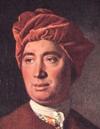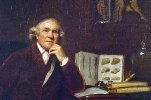David Hume topped this 2009 PhilPapers survey of most influential and admired philosophers (scroll down to bottom of the page to “Non-living philosophers most identified with”).
Aristotle came in second and Kant third. I’ve been thinking much about Nietzsche and Heidegger recently: eleventh and eighteenth, respectively. Overall, the list was still dominated by thinkers in the Analytic pantheon.
I have mixed feelings about Hume. He is often excellent as a critic of the traditional arguments for religion, and he is often shrewd in applied ethics and political economy. For example, I like very much this early statement of the benefits of money to facilitating free trade and comparative advantage:

“There seems to be a happy concurrence of causes in human affairs, which checks the growth of trade and riches, and hinders them from being confined entirely to one people; as might naturally at first be dreaded from the advantages of an established commerce. Where one nation has gotten the start of another in trade, it is very difficult for the latter to regain the ground it has lost; because of the superior industry and skill of the former, and the greater stocks, of which its merchants are possessed, and which enable them to trade on so much smaller profits. But these advantages are compensated, in some measure, by the low price of labour in every nation which has not an extensive commerce, and does not much abound in gold and silver. Manufactures, therefore gradually shift their places, leaving those countries and provinces which they have already enriched, and flying to others, whither they are allured by the cheapness of provisions and labour; till they have enriched these also, and are again banished by the same causes. And, in general, we may observe, that the dearness of every thing, from plenty of money, is a disadvantage, which attends an established commerce, and sets bounds to it in every country, by enabling the poorer states to undersell the richer in all foreign markets” (“Of Money” 1752).
Hume’s important weaknesses are in epistemology. He is an empiricist, which is great, but his empiricism is extremely atomistic, mechanical, and reductionistic. That approach leads to his skeptical conclusions about the perception of objects, about abstraction and concept-formation, about inductive generalization, and, metaphysically, about the reality of causality and the persistence of identity across space and time.
A sideways connection: It turns out that John Hunter, the surgeon and anatomist about whom I posted The Knife Man and Anatomy and philosophy, examined David Hume when Hume was in his final decline. In 1775 Hume began to suffer terrible abdominal pains, and, unfortunately, was attended “by the most eminent physicians of the day.” As biographer Wendy Moore puts it:
“None of them could offer a satisfactory explanation or effective remedy for Hume’s obvious decline. Though they were very happy to posit elaborate theories and propose assorted therapies, nobody was prepared to examine the patient in order to determine what might be causing his suffering” (italics added). The empiricist philosopher was surrounded by un-empiricist physicians.

John Hunter was called in by happenstance. Hunter and Hume were indirectly related through marriage, and in June of 1776 both men were in Bath. By then, Hume’s condition was very bad and Hunter was invited to examine him. Writes Moore: “Hunter laid his hands on the suffering man’s abdomen and could plainly feel a tumor, which he suspected was cancerous, in the liver” (p. 183). Internal abdominal surgery was not a realistic option, and the philosopher died two months later, back home again in Scotland.
Hume was philosophical in the best sense of the word when he learned, finally, about his condition. Writing frankly and forthrightly to his brother: “This Fact, not drawn by reasoning, but obvious to the Senses, and perceived by the greatest anatomist in Europe, must be admitted as unquestionable, and will alone account for my Situation.”
Related: My primer on Hume’s classic A Treatise of Human Nature, in the Philosophers, Explained series.
I have been reading a lot of Daniel Dennett’s work of late. Hume is his favorite philosopher. I’ve also read just about everything Ayn Rand had written and I’ve never fully understood Objectivism’s objection to reductionism/materialism. I find myself fascinated by Dennett’s ideas of a Darwinian process of competitive neural architecture giving rise to consciousness in the brain. Also, that conscious processes must arise out of processes that are themselves unconscious. I wonder if you would be willing to give your take on Dennett’s work in a future post?
Dennett is a storyteller, not a philosopher. His stories are fascinating, but they do not demonstrate the conclusions he reaches. Ultimately, his stories are Red Herrings and his conclusions, Non Sequiturs. According to Dennett, there is no such thing as “qualia” (see his “Quining Qualia”). Among other things, that means there is no such thing as pain. He explicitly stated that conclusion in “Brainstorms.”